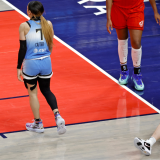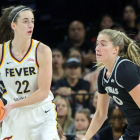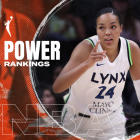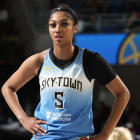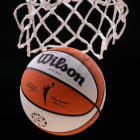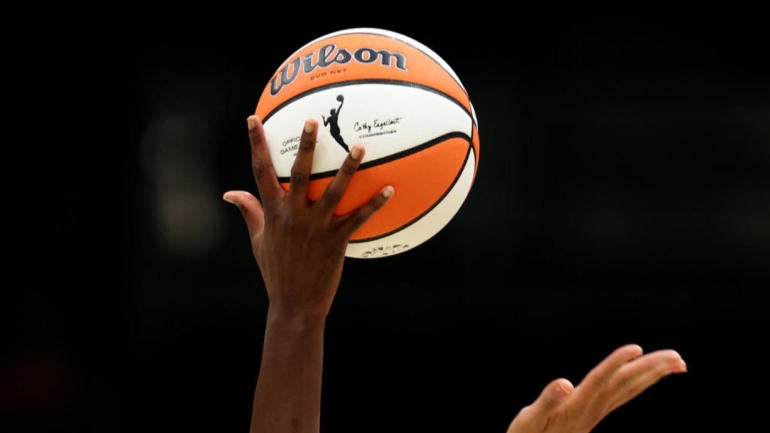
For the first time in its 28-year history, the WNBA will have league-wide charter flights for all 12 teams. The league is expected to fully implement the program Tuesday, exactly one week into the regular season.
"The decision to implement charters is not only the right thing to do, but it is also right for the business because it demonstrates the willingness of management to invest in the players. It's both," WNBPA executive director Terri Jackson told CBS Sports via email last week. "And 'competitive advantage' had nothing to do with it."
Although the final program is what players have vocally pushed for, especially during their 2020 collective bargaining agreement negotiations with the WNBA, the execution before full implementation this week has left players frustrated. CBS Sports collected responses from the WNBA, players, team representatives and the players association ahead of the full charter flight program rollout.
Before this season, charter flights were considered an unfair competitive advantage and prohibited for individual teams. Charter flights were also deemed too expensive to implement league-wide. According to Article XI, Section 4 of the current CBA, all teams must travel premium economy or similar enhanced coach fare for all league trips.
While the recent CBA was widely considered a vast improvement, improved travel remained at the top of the list, alongside increased salaries.
"During the negotiations for the current 2020 CBA and every off season thereafter, we put forward proposals that sought to phase in charter travel (for all teams during the regular season) over time by not requiring but permitting the teams to charter," Jackson said.
Players were especially vocal about travel as a safety concern when Brittney Griner returned to the league after her wrongful detainment in Russia. Despite the constant push for charter flights by the players, Jackson said the league's decision to implement a full charter program this year came as a surprise.
At the 2024 WNBA Draft, league commissioner Cathy Engelbert announced the charter program would expand for any teams competing in back-to-back games in the regular season, and it would once again be used in the playoffs. Less than a month later, in a meeting attended by a handful of media members, Engelbert stated charter flights would arrive during the 2024 season. Two days later, the league announced the program would roll out "as soon as practical for the 2024 and 2025 seasons."
"I am thrilled to see a significant change in policy that will permit and provide charter travel across all teams throughout the 2024 season and going forward," WNBPA president Nneka Ogwumike said in a statement acquired by CBS Sports on May 7. "On behalf of the players, I express my appreciation and support for a bold move by the commissioner and team governors that in turn shows that they understand and value the health and safety of the players. It is time to be transformational. It's time to bet on women."
One week later, only two of the five teams traveling on opening night were granted permission to charter.
"It's tough that the season is starting today and we're still trying to figure out those kinks," Connecticut Sun guard Dijonai Carrington told CBS Sports on May 14. "But some teams haven't figured it out. I don't know. It's just -- not happy about it, especially as a member of the players union."
Carrington, who is the WNBPA representative for the Sun, added that although there was a players-only meeting to clarify the charters, she was still murky on the details.
On May 14, CBS Sports heard from a source that teams were asked to complete a charter request during the final week of the WNBA preseason. Teams were informed the weekend leading into opening night whether they were granted charters for their first road game of the season. The same team representative stated they submitted travel requests for the entire season, though it was unclear when they would get word about their full charter schedule.
The WNBA said Thursday it expects to have "all teams flying charter by May 21." The league would not comment on how many teams were able to fly charter prior to the full-league rollout beginning Tuesday.
At least two teams -- Indiana and Minnesota on May 14 -- traveled charter within the first week of the season. Without question, six days is a short turnaround to refine logistics, and although the WNBPA reported players were told that Engelbert had been working on a charter flight deal prior to the announcement, it is unclear when the league was able to coordinate charter flights for the first 14 games of the season.
Undoubtedly there are a lot of moving parts, but that still left players wondering how the league determined what teams would be given priority.
Charter Flights are given to teams with long/conplicated travel … before May 21st …
— Brittney Sykes (@BrittBundlez) May 18, 2024
We leave May 20th for LA….. but we are not flying charter …
DC to LA 5+hr flight
Indy to Conn 1.5+ hr flight
No shade , just really interested for the reasoning @WNBA @CathyEngelbert 😊
At least part of the charter flight rollout confusion may be because the program was implemented without any formal amendment to the existing collective bargaining agreement.
In the past, teams were fined for using charters -- such as the New York Liberty, who payed to fly their players charter five times during the second half of the 2022 season, as well as during a team bonding trip to Napa Valley.
"Travel is a CBA matter, and this new change will need to be formalized in writing as a side-letter agreement with the union," Jackson said. "Corresponding policies and procedures will also need to be in writing and disseminated so that everyone knows what to expect and when."
In the absence of an amendments or formal negotiations, players have been left to wonder why charters were deemed an unfair competitive advantage in the past, but not during the early season rollout.
"I honestly still don't understand it," Carrington told CBS Sports on May 14.
Despite the league holding a town hall for players, Carrington and others were left with questions regarding the charter rollout.
For now, the league is handling the charter program, though Jackson says once an amendment is added to the current CBA, or fully instituted in the next CBA, charter flights may fall under team responsibilities.
"Over the years, we have heard from staff members on more than a few teams that team travel should be managed at the team level, and that it is already over-regulated at the league level," Jackson said.
A team representative told CBS Sports they are responsible for all commercial travel and ground transportation to and from any league coordinated charter flights.
The charter flight program was indeed bumpy out the gate, as Engelbert told players it might be. While players have raised valid concerns, what is also true is moving away from commercial flights bodes well not only for the safety of players but also for the current and future valuation of a league marching toward its third decade of operation.
"We've been working on this for four years trying to build a long-term, sustainable economic model to fund it, because that's what you need. And now, we feel really confident as our stock has gone up," Engelbert said in an interview during the Fever at Liberty game Saturday afternoon. "Now is the time to do it ... so proud that we're able to do it for the players."
Just one week into the season, the WNBA saw record ratings for Caitlin Clark's debut game in Connecticut and the Liberty made a $2 million profit in ticket sales for Saturday's 91-80 win over the Indiana Fever. Revenue, attendance and viewership have continued to rise since the 2020 season, and rookie stars like Clark, Angel Reese and Cameron Brink will lead the way for the next several league milestones.
So, what does that mean for the players? Both the league and the PA have until November to opt out of the current CBA and 2023 league MVP Breanna Stewart hopes the players will.
"Now that the commissioner has addressed or is working to address travel concerns, we are hopeful that the league and the teams will meet us at the negotiating table, at the appropriate time, prepared for transformational change, which includes increasing the players' salaries," Jackson said.








